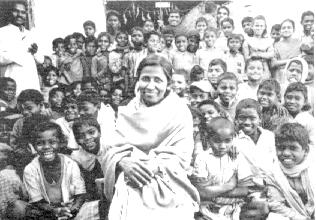MASSIHI GYANODAYA ABHIYAN
(Literally:
Campaign for a Awakening Wisdom)
Background - September 1994
Massihi Gyanodaya Abhiyan (Campaign for Awakening Wisdom)
is an effort to bring literacy to the area around Bodh Gaya,
a small town in the state of Bihar in North Eastern India. The
Buddha is said to have attained enlightenment here 2500 years
ago. In spite of this illustrious past, many of the people in
the area suffer tremendous hardship. Massihi Gyanodaya Abhiyan
was initiated and is managed almost single handedly by Ma Jaishree
Upadhyay (Sister Jessie), a Christian Sannyasin (renunciate)
from Kerala, who has spent many years teaching and working among
the poor of Bihar.
Sister Jessie decided to leave lush Kerala for depressed Bihar
because she knew it had the lowest literacy rate in India. She
is not attached to any order, but spent nine years with the Sisters
of Notre Dame working as a teacher and social worker. Now 44,
Sister Jessie wears the ochre robes of a Sannyasin and practices
karmayoga (contemplation through action), and nishkama (actions
without reward), and has virtually no possessions. Her life is
devoted to the welfare of the people of Bihar. With her unbridled
compassion and years of experience working in the area, Sister
Jessie is the ideal person to undertake this effort.

Sister Jessie
with students and a teacher
There are a few other assistance programs which reach the
area immediately around Bodh Gaya proper. However, most of the
tiny villages within a few mile radius receive no assistance
at all. It is in these poorest and most forgotten villages that
Sister Jessie focuses her work.
Why They're Illiterate
These Harijan (formerly known as "untouchable")
villages are among the most illiterate and poverty stricken in
India. Most of the children in these villages are bound to labor
in the home by the age of five while parents go out in search
of work. Apart from scarce work during the harvesting and planting
seasons, many must resort to begging. Primary education is free
in India but these children are not able to take advantage of
it because of their duty to help support their families.
Sister Jessie focuses her efforts on literacy because she
believes that the caste system is a cancer on Indian society
and that only through education can people overcome, or at least
question their status. In her own words: "Our earnest effort
is to bring about total literacy as a basic reformation for the
underprivileged.
An Innovative Model for Self Help
The Literacy program joins with and motivates local people
to help themselves and each other, across caste barriers in a
unique way. High school students and graduates of various castes,
mostly Harijans, are motivated to teach the children of their
own or nearby villages basic literacy.
Every Sunday, these student-teachers attend a two hour training
session. Instruction is given in creative teaching methods and
how to improve living standards. Environmental education, especially
the saving and replanting of trees, is also included. All student-teachers
and pupils use a small but effective lesson book that Sister
Jessie designed herself.
As a necessary incentive, student-teachers are paid two rupees
for every boy and three rupees for every girl taught per month.
The added incentive to teach girls is offered because women are
especially oppressed in Indian society. An exam is given every
three months to insure that students are learning. Only after
the exam are student-teachers paid.
Until now classes have been held either under a tree or the
veranda of a local temple. A current effort is to motivate students'
parents to construct a mud hut in which to hold classes at each
of the school sites. The hope is that more of the villagers will
recognize the importance of literacy and make a personal investment
to it through this cooperative effort.
Although the primary focus is on education, Sister Jessie
also makes some effort to distribute blankets and clothing. Around
95% of the Harijans, including the old, have no blanket or warm
clothing. Because of their malnutrition even 50 degrees (F) is
unbearably cold and during the winter it often drops down into
the 30's.
Progress: A Sign of Hope
This program is already achieving enormous success in spite
of tremendous restraints and minimal resources. Last year, with
the help of 47 student-teachers who range in age from 14 to 40,
Massihi Gyanodaya Abhiyan was able to reach over 40 villages.
More than 1700 children, who otherwise would not have had the
chance, received some instruction. Sister Jessie intends that
ultimately the work will be sustainable in real terms, when the
childrens' parents see the value of education and are willing
to contribute just a few rupees to the cause. Hopefully many
will eventually also be able to participate in the government's
educational system which is not possible until present vicious
cycles of poverty and illiteracy end. Even though many students
will not be able to continue on to a full education, this is
the first step toward education for many families.
Success Requires Support
To date the success of Massihi Gyanodaya Abhiyan has been
made possible only through private donations, but with no regular
means of support. At this stage funding is critical for Massihi
Gyanodaya Abhiyan to continue and become established. Please
help this extraordinary work to continue by sharing whatever
resources you can. Sister Jessie administers the spending of
every rupee herself, there are no administrative costs. Your
money will directly help towards the literacy of those for whom
otherwise it would be an impossibility.
BDA Home